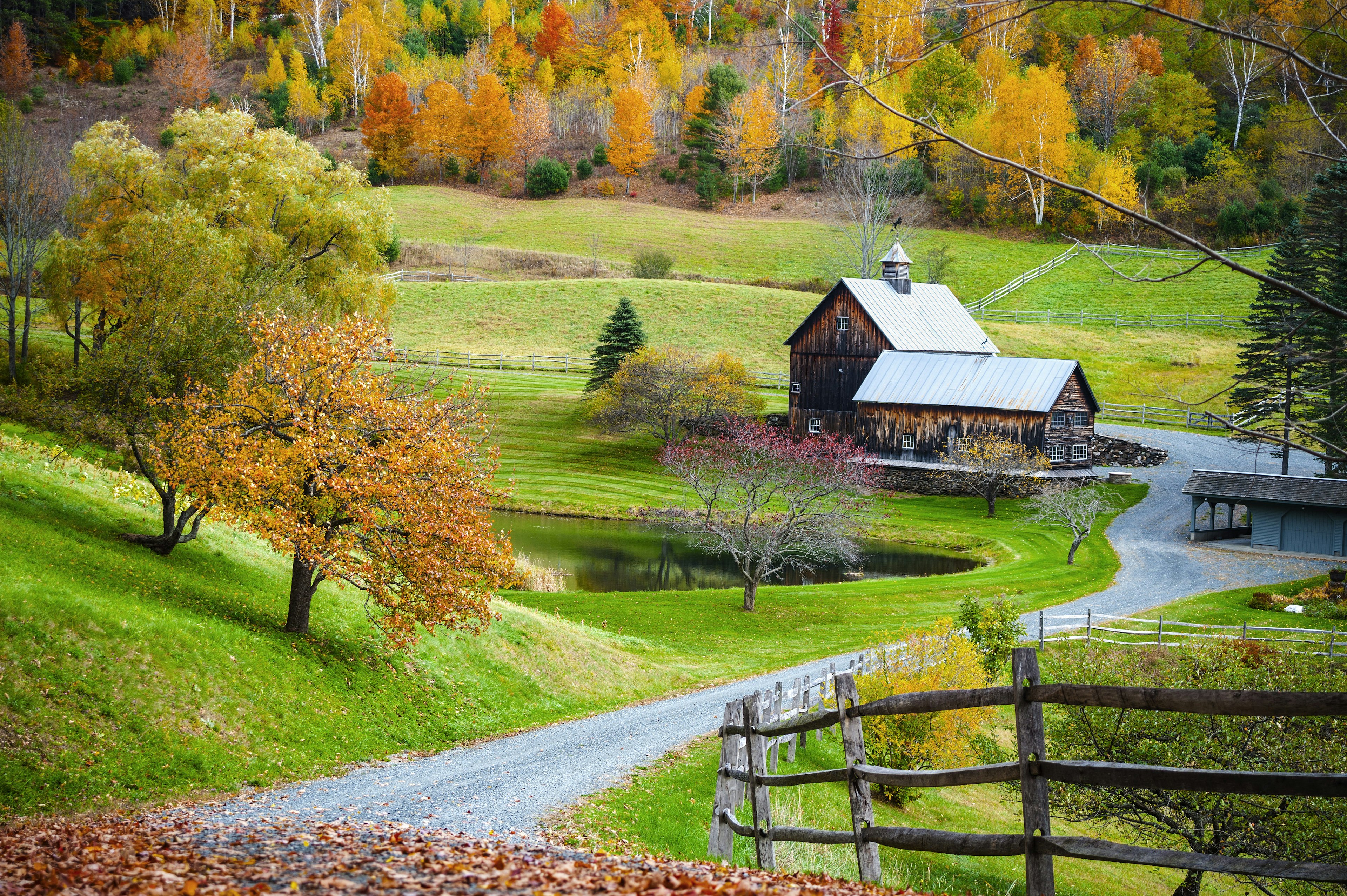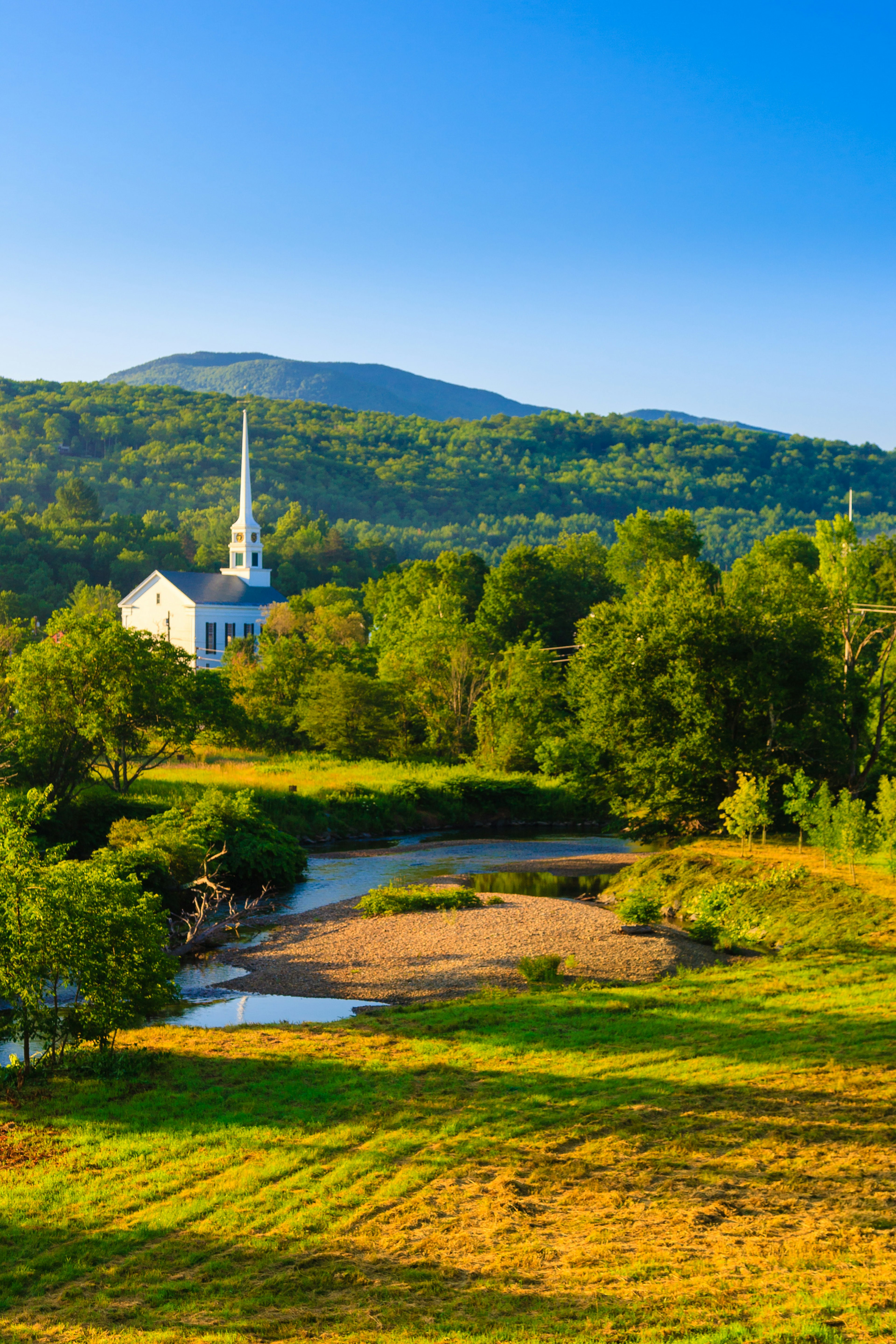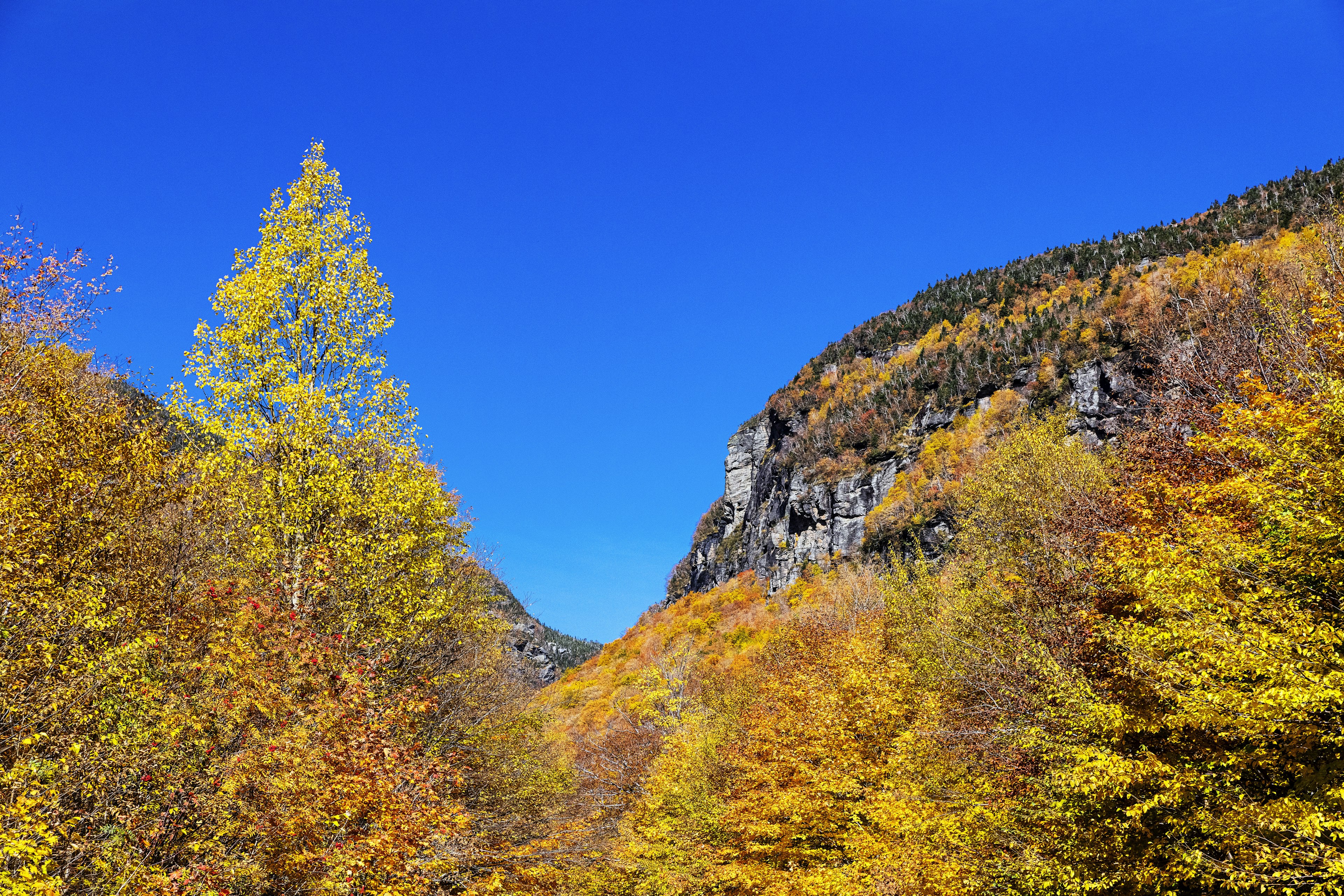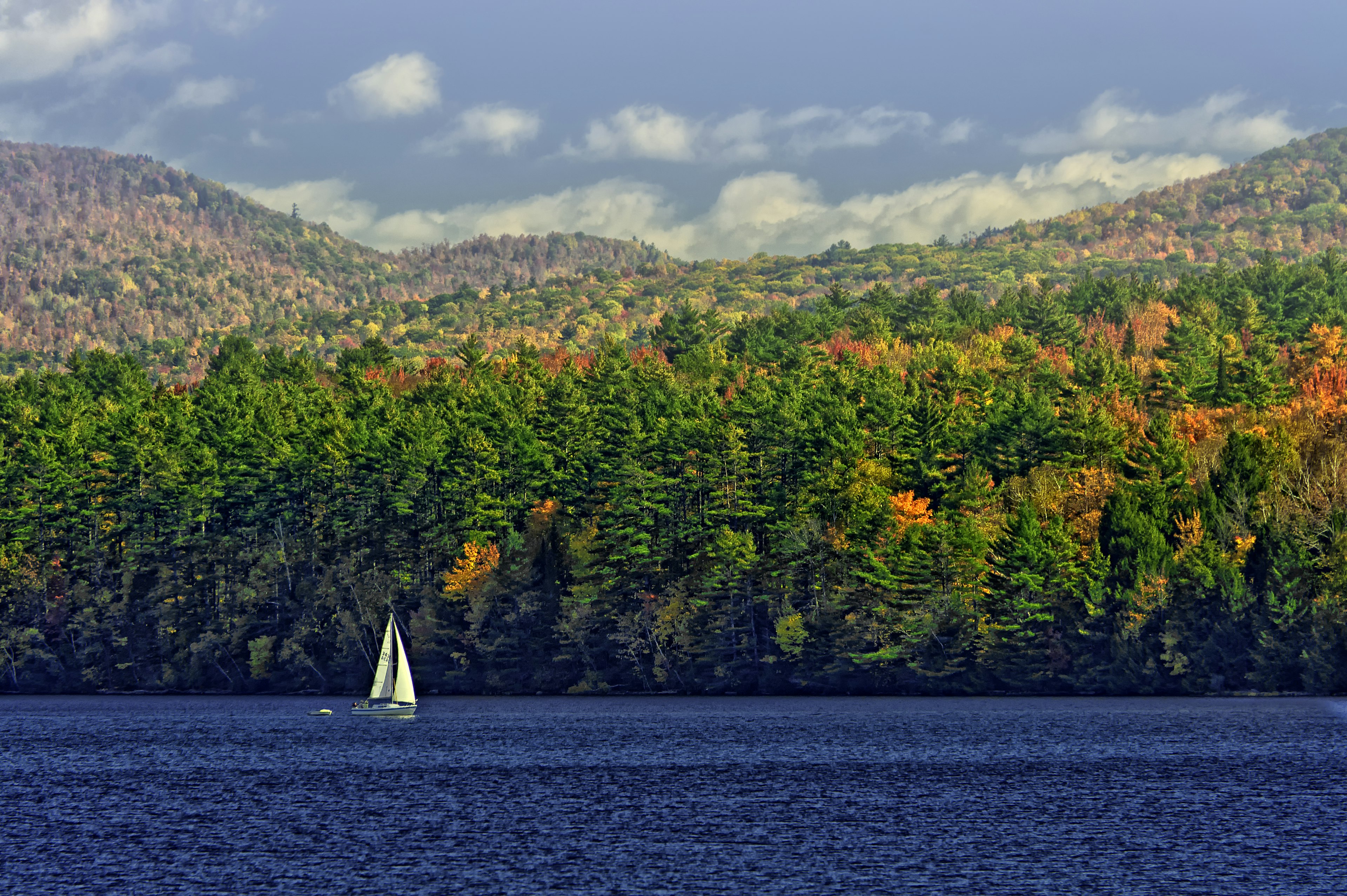Best known for country farms, farm-to-table restaurants, arts and crafts, rural charm and a wealth of history, Vermont has plenty to offer visitors all year round.
Tucked between the Adirondack Park’s 6 million acres, New Hampshire and the Atlantic Coast, the welcoming Green Mountain State teems with opportunities to explore in all seasons. Whether you splash around on the shores of one of the state’s 800-plus lakes, pick ripe apples from the tree or sample maple syrup as it comes out of the boiler, the state with the smallest capital in the US is ready for adventure.
Everything feels accessible in Vermont, and it’s easy to put together an itinerary that incorporates many different outdoor activities in one day. Whether you’re visiting for Open Studio Weekend, when Vermont’s artists welcome visitors to the spaces where they create, or you want to follow the state’s beer or spirits trail, here’s our guide to the best places to visit in Vermont.

1. Burlington
Best for Vermont-style urban exploring
In the heart of Burlington, Vermont’s biggest city, is Church Street, a pedestrian mall lined with charming boutiques, superb restaurants, and (of course) the mandatory Ben & Jerry’s. From here, there’s a lot to see and do within walking distance.
You’ll find many affordable and free things to do in town. In summer, musicians and street performers delight visitors on Church Street, while food cart vendors offer delicious local snacks. From Church Street, head west on Main or College Street to reach Waterfront Park, where you can discover an outdoor sculpture garden and stroll the boardwalk. On the park’s east end is the Burlington Bike Path, which is includes views of Lake Champlain, the Adirondacks and the city along its 14-miles. If you’re feeling even more adventurous, you can access the lakefront wilderness of Rock Point from North Beach.
Planning tip: If you’re planning to explore more of the rural areas east of Burlington, you’ll need a car. But if you like the idea of enjoying a car-free Vermont trip, Amtrak’s Ethan Allen Express and Vermonter trains serve the Burlington area and beyond. While you’re in town, you’ll find plenty more hiking and biking trails and Green Mountain Transit buses to get around town.
2. Montpelier
Best for living history and small-town charm
With 7500 residents, Montpelier is the US’s smallest state capital by population. This city’s focal point is the monumental 1859 Vermont State House, the state’s gold-domed Greek Revival capitol. Take some time to visit the landmark’s excellent art collection which has decorative and fine art exhibits. Next door at the Vermont History Museum, exhibits recount the state’s early history, highlighting Ethan Allen’s 18th-century adventures. Meander through downtown Montpelier for bakeries, restaurants and shops before heading to Hubbard Park’s observation tower for some of the best views of the capital.
Vermont’s 7 best hiking trails

3. Woodstock
Best for farm-to-table sophistication
Surrounded by rolling hills and stately horse farms, Woodstock is steeped in history. In 1786, it was a center of commerce, home to both industry and art, and one of Vermont’s largest and wealthiest towns. Relics from that golden era still remain, including the Woodstock Inn & Resort, which attracts city-dwellers to the country for a high-end weekend getaway.
Visit the circa 1880 pink sandstone Norman Williams Public Library, or Billings Farm & Museum, a functioning dairy farm with an 1890 farmhouse and exhibits that depict farm life like it used to be.
Nearby, a web of trails in Marsh-Billings-Rockefeller National Historical Park (the state’s first national park) invites walkers and nature lovers to explore. Take a dip or drop a line in the Ottauquechee River. It flows through the center of town and under the area’s three historic covered bridges.
4. Tunbridge
Best for harvest-time festivities
Most of the year, the three Villages that comprise Tunbridge, Vermont are pretty quiet. A few visitors wander to admire their five covered bridges, But in mid-September, Tunbridge comes alive. Vermont has many agricultural fairs, but the Tunbridge World’s Fair, which has taken place in Tunbridge continuously since 1867, is the most famous.
Held in mid-September, the fair features farming and agricultural demonstrations and contests, as well as arm wrestling, ox pulls and displays of the biggest and best produce and pies Vermonters can grow or make. Rides, contra dancing and a fantastic beer garden round out the offerings. But it’s the pig race that steals the show.
Detour: While you’re in town for the Tunbridge World’s Fair, take some extra time to experience more of what the White River Valley has to offer. More specifically, you’ll find the famed floating bridge in the nearby town of Brookfield. On the other side of the floating bridge, keep driving west to reach Allis State Park. From the top of Bear Hill, you will discover incredible mountain views that extend all the way to Killington, Mt Mansfield and the White Mountains of New Hampshire on clear days.

5. Stowe
Best for snowy adventures in the Green Mountains
Just off of Mount Mansfield (Vermont’s highest peak), Stowe is a classic New England town packed with local commerce and surrounded by natural beauty. Landmarked by the historic white spires of Community Church, the town of Stowe is one of the best places to stay in Vermont.
For the best of the area’s nature trails, hop on a mountain bike for a tour of Cady Hill before rewarding yourself with a fresh-from-the-farm lunch at the Sunday farmer’s market. Stay on the bike to glide along Stowe’s riverside recreational path and route to one of the town’s many swimming holes. If you like winter sports, then winter is the best time to visit Stowe for its superb alpine and Nordic skiing. Even if it’s not ski season, Vermont’s Ski History Museum brings skiing alive through its collections of gear and artifacts from ski seasons past.
Drive the Mt. Mansfield Toll Road or hike the Long Trail to the summit of Mt. Mansfield for sweeping views of New England. Catch the Vermont Symphony Orchestra for a concert at Trapp Family Lodge; the stunning sunset and superb music will make it unforgettable.
Local tip: Along the Smuggler’s Notch, Stowe and Mad River Valley beer trail, you’ll find several craft breweries, including Stowe’s own Idletyme Brewing Co., Alchemist Beer and von Trapp Brewing.
6. Lake Willoughby, Northeast Kingdom
Best for laid-back lake life
Five miles long and up to 320ft deep, Lake Willoughby is a glacially-formed lake that’s a National Natural Landmark. Carved deep into Vermont’s Northeast Kingdom, the lake lies between Mt. Pisgah and Mt. Hor, which together form the fjord-like Willoughby Gap.
In the late 1800s, steamboats paraded visitors around the lake. Now, public beaches at the north and south ends provide summer fun for swimmers and paddlers. Fishermen cast a line here for lake and rainbow trout, landlocked Atlantic salmon and native round whitefish.
At least 100 bird species populate this waterway: thrushes, warblers, hummingbirds, jays, finches, loons, herons, gulls and the rare peregrine falcon, which nests in the cliffs of Mt. Pisgah and Mt. Hor.

7. Smuggler’s Notch
Best for ruggedly beautiful natural scenery
During the War of 1812, the twisty, windy, cliff-lined, boulder-strewn mountain horse path between Underhill and Stowe was the mainline for supplies going to and coming from Canada. It played a similar role for booze during prohibition. And it was also part of the Underground Railroad. Now, a narrow, snaking road replaces the historic path through Mount Mansfield State Forest, making Smuggler’s Notch a key stop for Vermont road trips.
Drive it and explore the boulder field at the top where smugglers hid, and where now you’ll see rock climbers and boulderers ascending. Though the Notch is closed in winter, it’s just as busy with skiers, snowshoers, sledders and ice climbers.

8. Lake Champlain
Best for sailing away and navigating the open water
The sixth-largest lake in the United States, Lake Champlain, forms much of Vermont’s western border. At times, it’s been a Revolutionary War battleground, a supplier of ships in the War of 1812, a “line” in the Underground Railroad and home to the mythical monster Vermonters affectionately call “Champ.”
At 125 miles long and nearly 15 miles wide, the freshwater lake is sprinkled with motorboats, paddle boats and sailboats in the summer. Put in at any of the boat launches, marinas or beaches, and you could follow the lake north to Quebec via the Richlieu and St. Lawrence Rivers, or south to the Hudson River and Manhattan.
From the Vermont side, you can take a ferry to New York, including the Lake Champlain Ferries (which operate year-round) and the historic Ticonderoga cable ferry (check their website for seasonal operating hours). During the summer season, you can splash around on one of the lake’s many public beaches.
Explore the Champlain Islands, north of Burlington, and sample from the region’s best wineries, or pick apples in the fall in the Lake Shore’s fertile groves. Beneath its sometimes glassy, sometimes turbulent surface lies 300 historic shipwrecks. Dive them or learn about them at Lake Champlain Maritime Museum. Lake Champlain is also one of the top bass fishing lakes in North America.
9. Quechee
Best for grand scenery and year-round adventures
While the East Coast may not have North America’s tallest mountains or deepest canyons, you will find some exceptionally beautiful mountain and canyon scenery at Quechee State Park.
Formed by glacial activity some 13,000 years ago, the Quechee Gorge drops 165ft to the Ottauquechee River, making it one of the prettiest places in Vermont. If you’re here for fall leaf-peeping, a Quechee Gorge hike is certainly one of the top things to do in Vermont in the fall. If you come during the winter season, the nearby Quechee Club is one of the best places to visit in Vermont for easy skiing.
Planning tip: Despite the name, SmokyMountains.com provides the most comprehensive and accurate fall foliage map for the entire United States, including Vermont. While early October is usually a good bet to catch peak fall foliage in the Green Mountain State, it’s smart to check before you go.
10. Shelburne
Best for local flavors
Shelburne may only be about 8 miles south of Burlington, Vermont’s most populous city, but it remains a quiet rural community.
Visit Shelburne Farms to try artisanal cheese and maple syrup made on-site. Consider a stay at the Shelburne Farms Inn, an 1800s historic estate. The on-site restaurant has fresh and original dishes made from ingredients harvested at the farm and other local farms.
Beyond the farms, you should explore Northern New England’s most extensive art and cultural institution at the Shelburne Museum. Spanning 45 acres and 39 exhibition buildings, the Shelburne Museum has everything from paintings by famous French Impressionist artists like Claude Monet, Edgar Degas and Mary Cassatt to the beautifully restored 220-ft steamboat Ticonderoga that was built in Shelburne in 1906.
Planning tip: Shelburne Farms’ welcome center and walking trails are open year-round, but visit between May and October for one of the farm’s famed open wagon tours, to see the animals at the children’s farmyard, or to dine at the restaurant.
11. Manchester
Best for all-seasons fun
In southern Vermont, Manchester provides many opportunities for year-round fun and games. Whether you’re coming to Manchester to take in all the wondrous fall colors from the heights of Mount Equinox, taste the flavors featured at local restaurants like Raven’s Den and The Dorset Inn, or enjoy some summer tee time at The Golf Club at The Equinox, Manchester never feels bland.
While Illinois is officially the Land of Lincoln, you can see how Abraham Lincoln’s descendants continued his legacy at Hildene, a stately Georgian Revival manor built by Robert and Mary Lincoln in 1905. Explore the regal mansion and gardens, then hit the 12 miles of hiking trails, check out the sustainable goat dairy farm and even wander inside the beautifully restored 1903 Pullman car Sunbeam.
For more arts and culture, the Southern Vermont Arts Center has incredible exhibitions, workshops and local art. During the summer, dive deeper into the local culture with summer festivals like the Taconic Music Festival, Dorset Theatre Festival and the Green Mountain Bluegrass and Roots Festival. In winter, Manchester provides very easy access to various ski resorts to suit skiers of all ages and levels, including Bromley Mountain, Stratton Mountain Resort and Magic Mountain Ski Area.
Detour: For outdoor adventures in southern Vermont, Manchester may be the ideal base camp since it’s only 4 miles away from the Long Trail that extends the entire length of the State of Vermont, or 272 miles from the Massachusetts state line to the US-Canada border. Also note that this is where the Long Trail connects with the world-famous Appalachian Trail, which will lead you to even more incredible mountain wilderness.
You might also like:
5 US ski towns for people who hate skiingThe 12 best-secluded cabins to rent in the Northeast USA Audiobooks to narrate your US road trip
